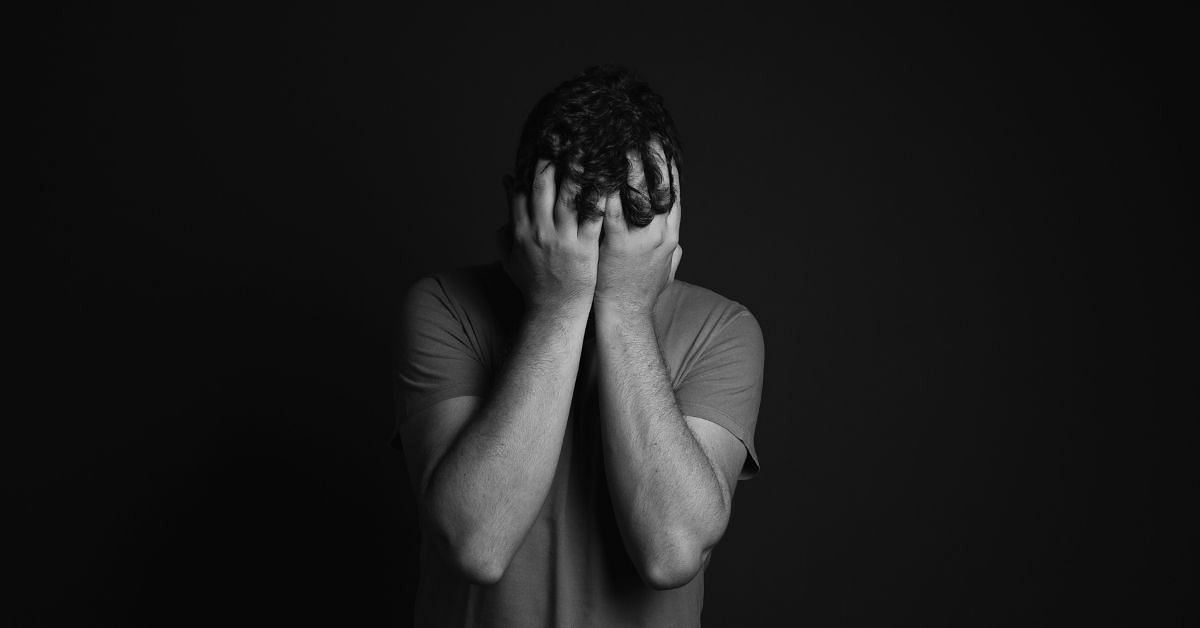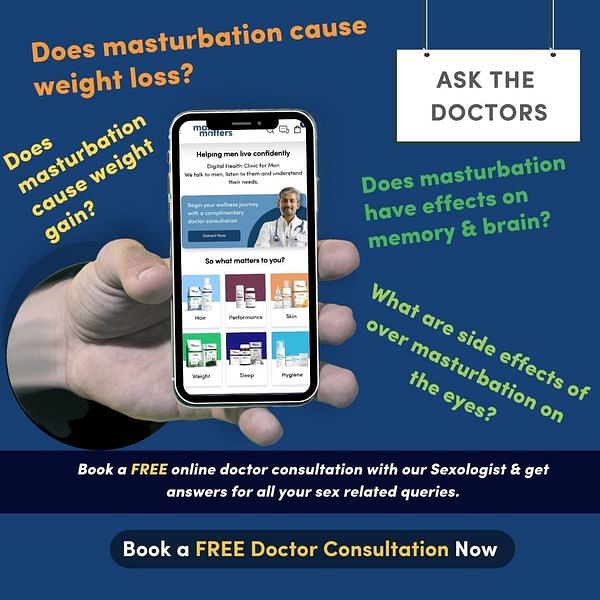How to Stop Masturbation in Men: A Comprehensive Guide
Masturbation is a completely natural habit. However, overdoing it may be bad for your health. Here is a comprehensive guide on how to stop masturbation in men.

Are You Masturbating A Lot?
You never know if you are masturbating a lot unless you realise it yourself. The habit of masturbating is not bad; overdoing is bad. Instances such as avoiding visiting your family or friends, or wanting to be alone in the room to masturbate, are a sign that you are overdoing it.
When you overdo things, it shows adverse effects on your physical and mental well-being. Let's explore some of the common ill consequences that can arise from excessive engagement in masturbation addiction in men:
- Health Complications: Overindulging in masturbation can lead to severe health complications such as skin irritation in the penis, Oedema, having swelling part due to inflammation or infection
- Mental and Emotional Issues: Overdoing certain bad habits harms mental and emotional well-being. For instance, excessive masturbation can lead to mental health disorders such as depression, anxiety, or burnout.
- Relationship Strain: Masturbation addiction negatively impacts interpersonal relationships and can lead to strain and conflicts. It affects the sex life with disinterest in sex. These addictive behaviours prioritise the habit over meaningful connections with loved ones.
- Decreased Productivity and Performance: Engaging in masturbation addiction can hinder productivity and performance in various areas of life, including work, academics, or personal goals. Procrastination, lack of focus, or poor time management can negatively impact achievements and personal growth.

Can't Stop Thinking About Masturbating
If this is a continuous sentence that comes into your mind-" I Can't Stop Thinking about Masturbating" it is time you seek help. There are ways and techniques on how to quit masturbation. Some men want to overcome the addiction and enjoy the normal course of masturbation. Know what your addiction is all about-
Masturbation addiction is a powerful force: This force can consume your thoughts and infiltrate every aspect of your life. It's a constant presence that seems to have an iron grip on your mind, making it challenging to break free.
The nature of masturbation addiction: It rewires the brain's reward system, creating a compulsive cycle that demands your attention. Many find themselves trapped in a loop, where thoughts of indulging in addiction consume their waking hours and invade their dreams.
The constant thought about masturbating leads to a range of emotions, from guilt and shame to anxiety and despair. You may feel trapped, hopeless, and powerless, wondering if you will ever escape its clutches. The intensity of these thoughts disrupts your ability to concentrate, affects your relationships, and impacts your overall well-being.
Acknowledging the power addiction: Have you thought about quitting masturbation? It is time to take action. It's essential to reach out to professionals, support groups, or loved ones who can provide guidance, understanding, and assistance in overcoming addiction. You will embark on the path to recovery.

Also Read: Does Masturbation Reduce Sperm Count - Expert Backed Guide
When Masturbation Turns Into an Addiction
Determining when masturbation becomes an addiction can be complex, as it depends on various factors and individual circumstances. However, some key indicators can help identify when masturbation crosses the line into addiction:
- Loss of Control: One of the defining characteristics of masturbation addiction is the inability to control or stop the behaviour, despite harmful consequences. It may indicate addiction if you find yourself repeatedly trying to quit or cut back on the habit without success.
- Compulsive Behavior's: Overdoing masturbation involves a sense of compulsion, where the urge to engage in the habit becomes overwhelming and difficult to resist. The behavior's may take priority over other responsibilities, relationships, or activities.
- Withdrawal Symptoms: What happens if you don't masturbate? When the habit is abruptly stopped or reduced, experiencing withdrawal symptoms such as cravings, irritability, restlessness, anxiety, or physical discomfort is a sign of addiction.
- Tolerance: Over time, individuals with excessive masturbation may develop tolerance, requiring more significant amounts or frequent engagement to achieve the desired effect. It can be a red flag indicating addiction.
- Negative Impact on Life: If the habit begins to negatively impact various areas of life, such as relationships, work or school performance, physical or mental health, and financial stability, it may become an addiction.
- Continued Use despite Consequences: Despite experiencing negative consequences such as health problems, financial difficulties, or strained relationships, individuals with addiction continue excessive masturbation, unable to stop or cut back.
It's important to note that addiction is a complex condition and can vary in severity. If you or someone you know is struggling with potentially addictive behaviour, seeking professional help from healthcare providers, therapists, or support groups can provide valuable guidance and support in addressing the addiction and will address how to stop masturbation in memory.

How to Know If You’re Addicted
Determining if you're addicted to something can be challenging. Here are some key indicators to help you assess if you're dealing with addiction:
- Loss of Control: If you cannot moderate or stop engaging in masturbating behaviour despite your best intentions, it may be a sign of addiction. You may repeatedly make promises cut back, only to find yourself giving in again.
- Withdrawal Symptoms: Experiencing physical or emotional symptoms when attempting to stop or reduce excessive masturbation strongly indicates addiction. These symptoms can include irritability, restlessness, anxiety, depression, cravings, or physical discomfort.
- Neglecting Responsibilities: When addiction takes hold, you might prioritise the behaviour over other aspects of your life, such as work, relationships, or personal obligations. You may neglect responsibilities or engage in risky behaviour to satisfy the addiction.
- Failed Attempts to Quit: Multiple unsuccessful attempts to reduce overdoing masturbation despite the negative consequences can be a telling sign of addiction. The desire to stop may be present, but the ability to do so becomes increasingly challenging.
- Obsessive Thoughts: If your mind is constantly preoccupied with thoughts of masturbation, to the point where it interferes with your daily life, it is an addiction indication. These obsessive thoughts have a strong compulsion to engage in the behaviour.
- Continue Use Despite Consequences: In the face of negative consequences, such as damage to relationships, declining physical or mental health, or financial struggles, addiction drives you to continue the behaviour.
Masturbation addiction is a complex issue, and self-assessment may not be sufficient for a definitive diagnosis. If you recognise these signs, seeking professional help from healthcare providers, therapists, or support groups is highly recommended.

Also Read: Masturbation Effects on Memory & Brain: Evidence Backed Answer!
Why Should You Stop Masturbating?
Breaking free from masturbation addiction is crucial for several compelling reasons.
Firstly, addiction hijacks lives, taking control of your thoughts, actions, and priorities. It consumes time and energy, preventing you from fully engaging in meaningful relationships and pursuing your goals.
Secondly, addiction damages physical and mental health, deteriorating well-being and potentially fatal consequences. It hampers your immune system, strains vital organs, and undermines your emotional stability.
Thirdly, addiction erodes personal and professional potential, hindering growth and stifling productivity. By overcoming addiction, you reclaim your autonomy, rebuild your health, and unlock a future of limitless possibilities.

How to Stop Masturbation?
Here are some practical tips to stop masturbating if you are addicted to it:
- Acknowledge the problem: Recognise and accept that you have a masturbation addiction.
- Set clear goals: Establish specific, realistic, and measurable goals to work towards. Breaking down your recovery process into smaller steps can make it more manageable.
- Develop a support network: Surround yourself with individuals who support your recovery and distance yourself from negative influences that may trigger a relapse.
- Replace unhealthy habits: Identify healthier activities or hobbies to replace addictive behaviours. Use physical exercise, mindfulness, or creative outlets to redirect your focus.
- Avoid watching nudity or pornography: Learn about the nature of addiction, its triggers, and the impact on your mind and body. Knowledge empowers you to make informed choices and develop effective coping strategies. Avoid watching porn, as it is one of the triggering agents for masturbation.
- Seek professional help: Consider consulting counsellors or therapists. They can provide personalised strategies for how to stop thinking about masturbation and support tailored to your needs.
- Love yourself by prioritising: This includes maintaining a balanced diet, getting enough sleep, and practising relaxation techniques.
- Build resilience: Develop healthy coping mechanisms to deal with stress and cravings. Engage in meditation, journaling, or deep breathing exercises to manage triggers and emotions.
- Stop spending time alone timeless: The less time you spend with yourself, the better it will be for you. Start getting social; enrol in a club, sport, or recreational activity.
- Wear extra layering of clothes over your underwear- You must start wearing more layering for your clothes as there is a thin lining between your underwear and your genitals. A slight touch to your genitals may encourage you to rub and masturbate.
What Happens If You Don't Masturbate
When you don't masturbate, you contribute more to your partner sexually. You tend to be more focused on each other. Foreplay time is more. You enjoy being with each other, and from dirty talks to dirty play, you can get in there. Learn some of the potential side effects of masturbation addiction below.
Also Read: Does Masturbation Increase Penis Size - Debunking the Myth!
Masturbation Side Effects
Nevertheless, if masturbation becomes compulsive, frequent, or forceful, it could potentially result in the following side effects:
- Oedema: Excessive gripping or excessive pressure on the penis during masturbation may lead to mild swelling, known as OedemaOedema.
- Skin irritation: Vigorous or rough masturbation can cause chafing and skin irritation. Usually, these irritations are mild and tend to resolve within a few days.
- Emotional distress: While masturbation is a natural and healthy sexual activity, some individuals may experience negative emotions such as guilt or shame afterwards, although these feelings are not inherently justified.
It's important to note that moderate and mindful masturbation practices typically do not lead to these side effects. If you have concerns or experience persistent discomfort, it's advisable to consult a healthcare professional for further guidance and support.
Also Read: Does Masturbation Decrease Stamina?

When Does Masturbation Become A Problem?
It is crucial to be mindful of when masturbation becomes problematic. It may indicate a deeper issue if the behaviour causes distress, becomes compulsive, and feels difficult to control. Individuals may find little satisfaction or pleasure from repetitive acts of masturbation and experience intrusive sexual thoughts that persist unwantedly. Chronic masturbation differs from conscious masturbation.
Some individuals numb themselves during masturbation to avoid uncomfortable feelings, reinforcing unhealthy patterns. The more frequently one masturbates in this separate way, the more ingrained these patterns become. Shame and guilt are often associated with this practice, leading to a mixed emotional experience. You must learn how to control the urge to masturbate.
Also Read: Does Masturbation Cause Weight Loss or Gain- Facts, Myths & FAQs
FAQs
Is Masturbation Healthy?
While masturbation is considered a standard and healthy practice, it can transition into problematic behaviour when it starts to cause distress, becomes compulsive, and feels challenging or even impossible to change. When the act of masturbation becomes all-consuming and difficult to control, it may be indicative of an underlying issue that requires attention and support. Maintaining a healthy balance and being mindful of boundaries is crucial for overall well-being. Seeking professional guidance can be beneficial in navigating and addressing any concerns related to masturbation addiction.
Is Masturbation Good or Bad?
Masturbation can have positive effects on both mental and physical health. It is a safe form of sexual expression, as there is no risk of pregnancy or contracting sexually transmitted infections.
Masturbation can serve as a form of stress relief and promote better sleep. During orgasm, the body releases endorphins, hormones that alleviate pain and induce pleasant feelings. These natural chemicals contribute to overall well-being and boost mood and relaxation.
Is Masturbation Harmful?
No, masturbation is not harmful. Excessive masturbation or masturbation addiction is harmful.
Does Masturbation Cause Pimples?
No, masturbation doesn't cause pimples. The production of excess oil, leading to acne, results from hormonal changes during puberty, not masturbation. The correlation between the two is simply a misconception.

